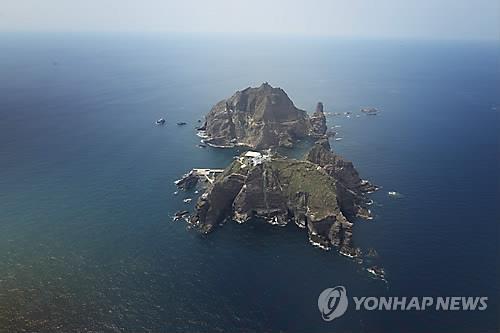- California Assembly OKs highest minimum wage in nation
- S. Korea unveils first graphic cigarette warnings
- US joins with South Korea, Japan in bid to deter North Korea
- LPGA golfer Chun In-gee finally back in action
- S. Korea won’t be top seed in final World Cup qualification round
- US men’s soccer misses 2nd straight Olympics
- US back on track in qualifying with 4-0 win over Guatemala
- High-intensity workout injuries spawn cottage industry
- CDC expands range of Zika mosquitoes into parts of Northeast
- Who knew? ‘The Walking Dead’ is helping families connect
S. Korea slams Japan’s renewed claims to Dokdo
SEOUL, April 15 (Yonhap) — South Korea denounced Japan Friday after Tokyo issued a diplomatic report renewing the country’s claims to the South’s easternmost islets of Dokdo.
The annual report, Diplomatic Bluebook 2016, was reported to the Cabinet with claims that Dokdo is clearly Japanese territory historically and under international law.
“It is beyond deplorable that the Japanese government repeated its unjustified territorial claims to Dokdo, which is our territory historically, geographically and by international law,” Cho June-hyuck, a spokesman of Seoul’s Foreign Ministry, said in a statement. “We demand an immediate withdrawal of the (claim).”
Cho urged Japan to stop its “futile claims” and work to open a “new future” for bilateral relations by squarely facing up to history.
The report is the latest in a series of actions that have threatened to undermine the mood for bilateral cooperation in the wake of last year’s landmark agreement to resolve the issue of Tokyo’s wartime sexual enslavement of Korean women.
Last month, Tokyo also approved a set of updated high school textbooks that repeated Japan’s territorial claims to Dokdo. The authorization represented a bolstering of the claims because 27 of the newly approved 35 social studies textbooks — or nearly 80 percent — accused South Korea of “illegally occupying” the islets.
South Korea rejects the claims as nonsense because the country regained independence from Japan’s 35-year colonial rule in 1945 and reclaimed sovereignty over its territory, including Dokdo and many other islands around the Korean Peninsula.
Chung Byung-won, director-general of the ministry’s Northeast Asian affairs bureau, called in Hideo Suzuki, a minister at the Japanese Embassy in Seoul, to lodge a protest, according to a ministry official who spoke on the condition of anonymity.
Dokdo, a pair of outcroppings lying in the East Sea, has long been a thorn in bilateral relations. Seoul effectively controls the islets with a police detachment stationed there since 1954.
Japan first mentioned the Dokdo claims in the diplomatic report in 1963 and has since carried the claims in the book on an irregular basis without putting them in the reports issued in 1967-1970, 1988-1989, 1993-1996, 1998-1999, 2002 and 2007.
This year’s report still referred to South Korea as Japan’s “most important neighbor that shares strategic interests,” saying Tokyo will improve bilateral relations following the agreement on the issue of the sex slaves. The accord will be the key to opening a “new era” in the two countries’ ties, it added.
Last year’s report referred to the South simply as the “most important neighbor,” which marked a toning down from the 2014 report that said the two countries share basic values and interests, such as free democracy and basic human rights.
On North Korea, the latest Bluebook said Japan demands Pyongyang take specific steps toward denuclearization. Japan is a member of the now-stalled six-party talks on North Korea’s nuclear weapons program and last month adopted its own punitive measures separate from U.N. Security Council sanctions to punish Pyongyang for its nuclear test in January and long-range rocket launch in February.
The report also said Japan will work to resolve the issue of the Japanese citizens who were abducted by Pyongyang in the 1970s and 1980s.













Pingback: Japan renews claim to Dokdo | B2K